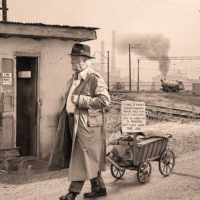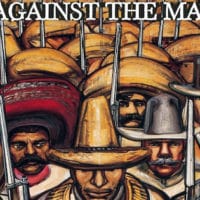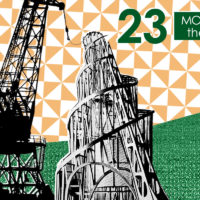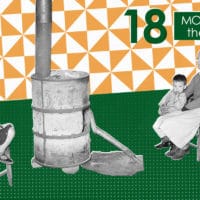-
Re-embracing internationalism and class solidarity in the time of #BlackLivesMatter
The struggle against systemic racism and the police state in the U.S. is integral and linked to the struggle against U.S. wars of aggression overseas.
-
Black deaths at the hands of law enforcement are linked to historical lynchings
U.S. counties where lynchings were more prevalent from 1877 to 1950 have more officer-involved killings
-
Socialism, capitalism, and cholera in 19th-century Hamburg
I certainly didn’t expect to spend the start of 2020 wading through nearly 700 pages about the 1892 Hamburg cholera epidemic, but I’m glad I did. Death in Hamburg, British historian Richard J. Evans’ social history of the epidemic, is a page-turner, his passion for the topic nothing short of infectious.
-
The 1930s and now: Looking back to move forward
While there are great differences between the crises and political movements and possibilities of the 1930s and now, there are also important lessons that can be learned from the efforts of activists to build mass movements for social transformation during the Great Depression. My aim in this paper is to illuminate the challenges faced and choices made by these activists and draw out some of the relevant lessons for contemporary activists seeking to advance a Green New Deal.
-
Rage Against The Machine – Interview with Noam Chomsky (from The Battle Of Mexico City)
The Mexican-American War began with a dispute over the U.S. government’s 1845 annexation of Texas. In January 1846, President James K. Polk, a strong advocate of westward expansion, ordered General Zachary Taylor to occupy disputed territory between the Nueces and Rio Grande Rivers. Mexican troops attacked Taylor’s forces, and on May 13, 1846, Congress approved a declaration of war against Mexico.
-
Building Capacity with Money on the Left
This month’s Money on the Left episode departs from the show’s regular interview format to reflect on the past, present and future of the Money on the Left project as a whole. We focus, in particular, on a recent special scholarly journal issue dedicated to Money on the Left, which was published by Liminalities: A […]
-
12 ways the U.S. invasion of Iraq lives on in infamy
While the world is consumed with the terrifying coronavirus pandemic, on March 19 the Trump administration will be marking the 17th anniversary of the U.S. invasion of Iraq by ramping up the conflict there.
-
A case study of corporate media disinformation
Corporate America’s disinformation relies on politicians, media and NGOs to implant their messaging. An essential part of combatting that messaging requires us to question our own views, as none of us are entirely immune to disinformation techniques, which have in effect become an advanced science.
-
From Liberation Theology to Public Money Creation with Delman Coates
Reverend Dr. Delman Coates joins Money on the Left to discuss why the politics of public money creation are essential for social and spiritual liberation. Dr. Coates holds a Master’s in Divinity from Harvard and a Ph.D. in New Testament & Early Christianity from Columbia University. He currently serves as Senior Pastor at Mount Ennon […]
-
For Mabel Lee, a pioneer for suffrage, some recognition at last
Not all US women were given the right to vote in 1920, despite leading courageous efforts to widen the franchise.
-
Rebellion in Chile recalls painful history
The U.S. government facilitated the military coup in 1973 and is surely paying attention to Chile now. U.S. officials may be confident in the staying power of current regime but undoubtedly have concerns about the future of investments and trade.
-
The U.S. is recycling its big lie about Iraq to target Iran
The U.S.’s campaign against Iran has violated the most critical lessons that U.S. and UN officials claimed to have learned from the debacle in Iraq.
-
Why the U.S. might be angling for the return of a new ‘strongman’ like Saddam in Iraq
The departure of the former Quds Force commander Qassem Soleimani is beginning to be felt in Iraq.
-
Marx, dead and alive
“It’s really interesting, isn’t it, how certain people would want to go to such lengths to smash Marx. Do they really think they’re going to destroy the ideas by destroying the grave? …people feel so afraid of Marx. Is there any other intellectual throughout history that is like that?”
-
A letter to intellectuals who deride revolutions in the name of purity
The ‘stubborn class struggle’ inside the revolutionary process should provide someone who is not part of the revolutionary process itself to be sympathetic not to this or that policy of a government, but to the difficulty—and necessity—of the process itself.
-
The Wall and General Pyrrhus
A stern, history-based evaluation awakens doubts that, despite the paeans in the world media, the fall of the Berlin Wall was not purely a peaceful revolution, a choice of freedom by the masses, another successful victory for freedom and justice as in past centuries.
-
America sponsors far-right holocaust revisionist exhibit in Kiev (Part I)
Why is a major federal agency funded by Congress helping push this bile on the Ukrainian people?
-
United States foreign policy: yesterday, today, and tomorrow
Mapping out the connections between the initiation of the permanent war economy, the drive for US empire, and today’s factional disputes and similarities among political elites.
-
No Depression in Heaven with Alison Collis Greene
In this episode of Money on the Left, we speak with historian Alison Collis Greene about her book No Depression in Heaven with an eye toward contemporary debates around the Green New Deal. Subtitled The Great Depression, the New Deal, and the Transformation of Religion in the Delta, Greene’s book critiques what she calls the […]
-
The Berlin Wall thirty years later
Even thirty years have not accustomed all ex-GDR citizens to seeing youngsters in the streets with their ragged dogs and paper cups for charitable donations, concert violinists begging money with Mozart in cold subway stations or, on icy nights, homeless huddled figures in sleeping bags on the stations’ concrete floors.



















